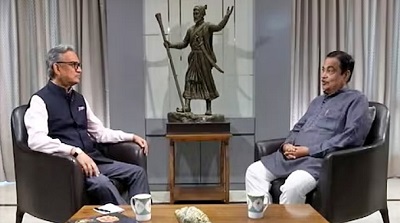New Delhi, (Samajweekly) Minister of Road Transport and Highways Nitin Gadkari on Monday said that the government has plans to introduce electric buses in all Indian cities as well as some long routes such as Delhi-Shimla, Delhi-Chandigarh and Pune-Mumbai over the next five years.
In an interview with NDTV Editor-in-Chief Sanjay Pugalia, the minister also said that the decline in battery prices will lead to travellers saving 30 per cent on fares and help bring down pollution.
The minister pointed out that the cost of lithium-ion batteries has come down from $150 per kilowatt per hour to $112 as the segment has recorded a 350 per cent growth in the country.
“When this comes down to $100, the operating cost will be the same as that of petrol and diesel vehicles,” the union minister said. “If you spend Rs 20,000–25,000 on petrol vehicles in a month, you will incur only Rs 2,000 on electric vehicles,” he added.
EV manufacturing has gained pace in the country, with output rising across segments. “There are 400 electric scooter manufacturers (in India). We have manufacturers making electric scooters with a range of 60 km,” Gadkari said.
The minister’s comments come in backdrop of the Government’s approval for the scheme to promote India as a manufacturing destination of e-vehicles (EV). The policy is designed to attract investments in the e-vehicle space by reputed global EV manufacturers, the Commerce Ministry said on Friday.
The policy fixes a minimum investment of Rs 4,150 crore (∼USD 500 million) for foreign companies who want to set up electric vehicle manufacturing facilities in India. The scheme which aims to attract investments from leading EV manufacturers, such as Elon Musk-led Tesla, does not fix any upper limit on the investments.
The scheme also stipulates a 3 years timeline for setting up manufacturing facilities in India, and starting commercial production of EVs. It lays down that 50 per cent domestic value addition in manufacturing must be reached within 5 years at the maximum.
Companies setting up manufacturing facilities for EVs will be allowed limited imports of cars at lower custom duty as an incentive.









